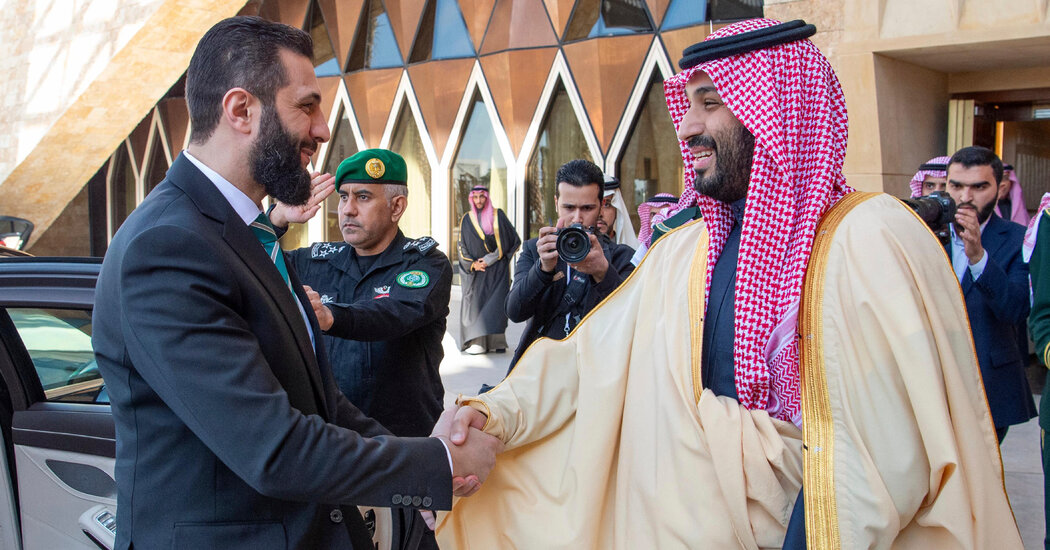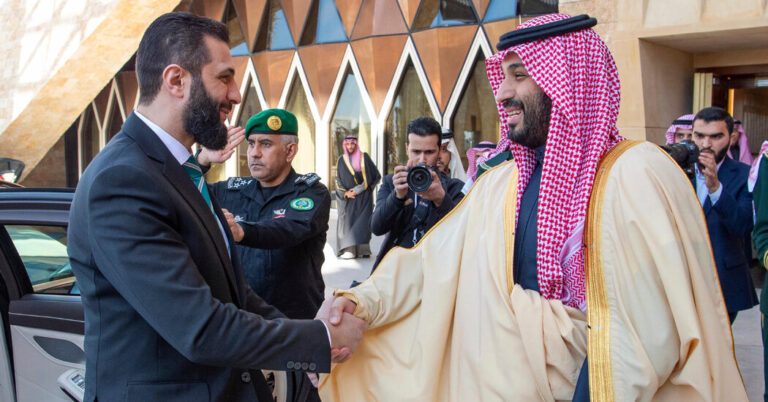The new interim president of Syria, Ahmed al-Shara, arrived on Sunday in Saudi Arabia for his first foreign journey from his rebel coalition the longtime dictator Bashar al-Assad, saying that his country is looking for a true collaboration with The kingdom of the Gulf.
Al-Shara landed at Riyad airport, in the Saudi capital on Sunday afternoon. The new flag of Syria flew next to the Saudi flag at the airport. Al-Shara later he met the hereditary prince of the reign rich in oil, Mohammed Bin Salman, according to the Syrian media and the Saudi state.
The choice of Saudi Arabia for the first Al-Shara journey abroad was seen as a reflection of the married political alignments of Syria under the new leadership of the country: far from Iran, which was a key ally of the Assad regime and towards the gulf.
Al-Shara said that after his meeting with Prince Mohammem he “perceived and felt a genuine desire” to support Syria during his next reconstruction phase, according to a declaration of his office published by the state media.
The two men held “large discussions” on a variety of topics, including growing communication and cooperation in “all areas, in particular humanitarian and economic”, added the declaration.
Prince Mohammed wanted Mr. Al-Shara “Success and Guide” in his new role as an interim president, according to a separate declaration of the Royal Court.
The journey follows a burst of diplomatic meetings in the capital Syria, Damascus, in recent weeks. Since the rebellious coalition seized power in December, diplomats from Europe, the United States, Gulf and Russia have crowded Damascus to meet with Al-Shara and to establish contacts with his government.
The results of those diplomatic openings will help to model the new political map of Syria and the dynamics of power throughout the Middle East, a region that is redone in the wake of the Israeli wars in Gaza and Lebanon and the collapse of the Government of Assad.
Iran has had its influence throughout the region significantly decreased by Israel’s wars, which targeted the Tehran proxy. Russia is facing a serious challenge to its military strategy in the Middle East and Mediterranean after losing its main ally in the region, al-Assad. And Turkey, who supported the rebels, emerged as a leading force in Syria.
Although initially cautious on the Islamist factions that seized power in Syria in December, the Gulf States increased their commitment and support for Mr. Al-Shara and his interim government. At the beginning, the new leaders of Syria urged to demonstrate the inclusiveness and tolerance for the different seven of the country.
Thursday, the Emir of Qatar met al-Shara in Damascus, marking the first visit to the Syrian capital by a Gulf Head of State since the rebellious coalition seized control. The visit underlined the interest of powerful supreme sovereigns in shaping a post-axad Syria under the guidance of Al-Shara.
For Saudi Arabia, recent events have presented a critical opening to reaffirm the influence both in Syria and in Lebanon, two countries where the kingdom had once thinned for the shadow and largely lost in Iran in the last ten years.
Saudi Arabia has projected support to the new Syrian government and asking for the removal of western and European sanctions imposed on the Al-Assad government. After the appointment of Mr. Al-Shara as an interim president last week, the king of Saudi Arabia and the hereditary prince both sent messages of congratulations to Mr. Al-Shara.
Al-Shara also reported the importance of the report, releasing his first exclusive interview of the Arab Media in December to the Al Arabiya broadcaster owned by Saudi rather than at the Jazeera del Qatar, on which he has appeared several times in the past ten years.
“Saudi Arabia has an important role in the future of Syria and I am proud of everything he has done for us,” he told Arabiya, remembering his childish years spent in Riyadh before his family returned to Syria.
For decades, Syria was the closest Arab ally in Iran in the Middle East and a key player in the competition for the regional influence between the monarchies of Tehran and the Gulf.
After the beginning of the Syrian civil war in 2011, Saudi Arabia and the United Arab Emirates were signs of Mr. Al-Assad. Both countries closed their embassies in Syria in 2012 between the brutal repression of dissidents by Al-Assad, who became a pariah in the region.
But after a decade of war, the attitudes of the gulf seemed to change while the Saudi Arabia and the United Arab Emirates tried to bring Signor al-Assad back to the Arab-a pounding moved at least partly led by the desire to curb the growing influence of the Iran in the region at the time.
At the beginning of 2023, Saudi Arabia offered humanitarian aid to the Assad regime after a devastating earthquake hit Turkey and Syria. Later that year, Syria was readmitted to the Arab League after a decade of isolation.
But with the reversal of Mr. Al-Assad, Iran has been put aside in Syria-and and Saudi Arabia seems to have taken the opportunity to try to establish its influence with Damascus.





